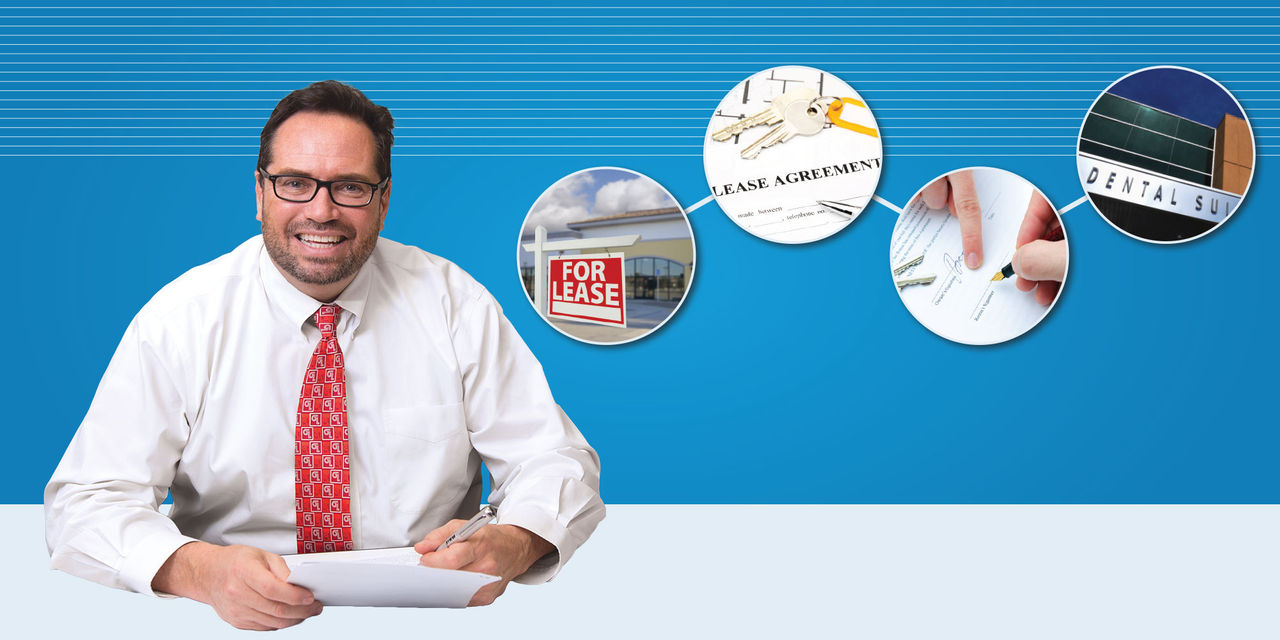Legal Matters – Commercial Real Estate: The Lease of Your Concerns

For most of us, the single biggest long-term investment we will ever make is the purchase of a home; for you, the independent dentist/small-business owner, running neck and neck with that is the lease of your commercial office space. While they might strike you as carrying the same weight, the differences can be stark. When purchasing a house, governmental regulations exist to protect your interests, so you don’t really have to read the fine print too carefully (no, I didn’t say that, and I’ll deny it if asked). By contrast, there are no systemic protections in place when it comes to signing a commercial lease. Without counsel in your corner, you are a sardine in a sea of sharks. A wrong move can be very costly.
To that end, and in keeping with my promise to present you with relevant information you can actually use, I present to you my tips, warnings and pitfalls to look out for when doing your own preliminary review of your commercial lease (sorry, no tips on finding the perfect location — that is all your job).
Get a knowledgeable lawyer
I know it seems obvious, but if you heed only one piece of advice, this is the one, especially if you are not going to take the time to read and understand all of the provisions in your lease. Even then, it is often the provisions left out that do the most damage later on. So don’t get just any old lawyer to flip through the lease agreement and put a stamp on it; get a knowledgeable lawyer who practices in this area of law, and don’t sign anything until she reads it and advises you appropriately.
Have a way to get out of the lease
I have found that many great business people are extreme optimists; when entering into various agreements, they think nothing can go wrong. As a lawyer, I have spent a sizable portion of my career helping these well-intentioned people find creative ways to break agreements that they have entered into.
The fact is, you cannot always anticipate changes in your situation, needs or dreams. So consider planning ahead by negotiating the shortest possible lease term that you can, with the option to renew, and placing it in writing under the TERMS AND TERMINATION portion of the agreement. Also, consider documenting the option to assign the lease or sublet. The landlord will require their “express written permission,” so be sure to include phrasing indicating that the “landlord will not unreasonably withhold permission.”

Know the total rent obligation
This can be the trickiest, because your natural tendency may be toward looking at the base rent rate and considering that cumulative. In reality, there are many components that can affect the total rent obligation. In the case of a rental rate calculated on the basis of rentable square feet in the leased space (also known as a “gross lease,” or a lease that is based only on square footage), it is important to understand how the landlord represents and measures the space, as that will have a direct effect on the amount of rent you pay. There can be a vast disparity between “usable square feet” and “rentable square feet.” This is especially true in leases where the common areas on multi-tenant floors are divided among the various tenants and included in the calculation of “rentable square footage.” Remember, the higher the square footage, the higher the rent, so some landlords may be tempted to be very liberal in their calculation. Don’t be afraid to get out your own tape measure!
On the other hand, you may be looking into a property with a “net lease,” or a lease in which you may also be responsible for paying a pro rata share of operating expenses — things like real estate taxes, common-area maintenance and utilities costs, and insurance expenses. There are a lot of moving parts in this type of lease, so be on your guard. Additional pass-through charges can be substantial, representing a significant bump in the per-month rental price, yet have little to no direct relation to the operations of the building. They may even entail improvements to the building that surpass the life of your lease. Imagine a lease that allows the landlord to put a new roof on the building and allot the entire cost of the roof to the operating expenses of a single year, even though a roof is considered a structural element that can have a lifespan of more than 20 years!
When you are comparing locations, you need to consider these “potential” expenses and the manner in which the prospective landlord calculates them. If the building is only 50 percent occupied, are the current tenants still liable for covering entirely the plethora of maintenance fees, taxes and insurance expenses? Is the tenant contributing the largest amount about to move out, saddling you with a bigger proportion of the expenses than at the time of signing? If you’re the sole remaining tenant, does it fall to you alone? You need to be able to calculate the cost of these various additional expenses in the same manner as the landlord does — in particular, how the cost might change — so you can be sure to understand how they will affect your lease payment.

Understand your liabilities
Once you’ve got a firm grasp on the lease price, it’s a good idea to skip right to the indemnity and insurance paragraphs when reading over a lease agreement. Indemnity defines your liability for incidents that occur on-site. Who pays for lawsuits against the landlord? Who pays to ensure the building’s compliance with the Americans with Disabilities Act? Don’t agree to pay for the conduct of the landlord, other tenants or Mother Nature. You should be responsible only for your own conduct and that of your invitees (e.g., your patients and employees). Confirm with your insurance broker that your policy will cover your indemnity and other liability obligations, and, if it will not, renegotiate the indemnity clause before signing. In that spirit …
Negotiate
Everything is negotiable, of course — the landlord will expect that. But beyond negotiating how much and what you will pay for, you should also negotiate the “free stuff” you expect. Ask for improvement allowances and a rent-free period during move-in; at a minimum, ask for new carpet and paint, or for walls to be moved. Make sure the construction obligation falls on the landlord, and make sure there is a time frame for construction to end (you can motivate the landlord to hit that end date by making sure you’re not responsible for paying rent during construction). Then ask for additional rent-free months and …
Get it in writing
Make sure every concession you negotiate is codified in writing. No matter what promises are made, if they are not explicitly included in the body of the lease, then they will likely be excluded by an all-encompassing clause that states something like, “This is the entire agreement.” Remember: If it’s not written down, it never happened.
Good luck out there! Be sure to email me at garythelawyer@glidewelldental.com if you have any questions or comments.



